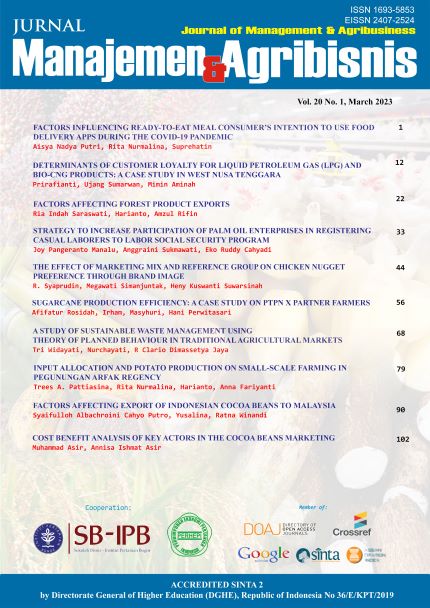The Influence of Social Norms on The Behaviour of Farmer Business Credit
Abstract
This study is important because an individual does certain behaviors if important people in his life can accept his behavior and he can accept what he will do, including taking Farmer Business Credit (KUT), so that he does not make mistakes by controlling his behavior later. This study aimed to investigate the effect of social norms on farmers' Farmer Business Credit (KUT) behavior in Kendal Regency, Patean Subdistrict, Central Java as a mediating variable. The research population included all farmers who took KUT in the Patean subdistrict, Kendal Regency, Central Java, totaling 128 people, and all of them were used as samples. Hence, the sample selection method was the census method. The AMOS-25 program analyzed data. The results show that social norms positively and significantly impact the behavior of KUT indebtedness to farmers in the Patean subdistrict, Kendal Regency, Central Java. Interest in debt can mediate the impact of social norms on the behavior of KUT indebted to farmers in the Patean subdistrict, Kendal Regency, Central Java. The managerial implication of the research is that it will provide an understanding of the importance of knowing the factors that influence farmers on the behavior of taking and managing businesses well in supporting the development of their farming business.
Keywords: social norms, farming business, farmer business credit, behaviors, AMOS
Authors
Authors who publish with this journal agree to the following terms:
- Authors retain copyright and grant the journal right of first publication with the work simultaneously licensed under a Creative Commons Attribution License that allows others to share the work with an acknowledgement of the work's authorship and initial publication in this journal.
- Authors are able to enter into separate, additional contractual arrangements for the non-exclusive distribution of the journal's published version of the work (e.g., post it to an institutional repository or publish it in a book), with an acknowledgement of its initial publication in this journal.
- Authors are permitted and encouraged to post their work online (e.g., in institutional repositories or on their website) prior to and during the submission process, as it can lead to productive exchanges, as well as earlier and greater citation of published work (See The Effect of Open Access).

